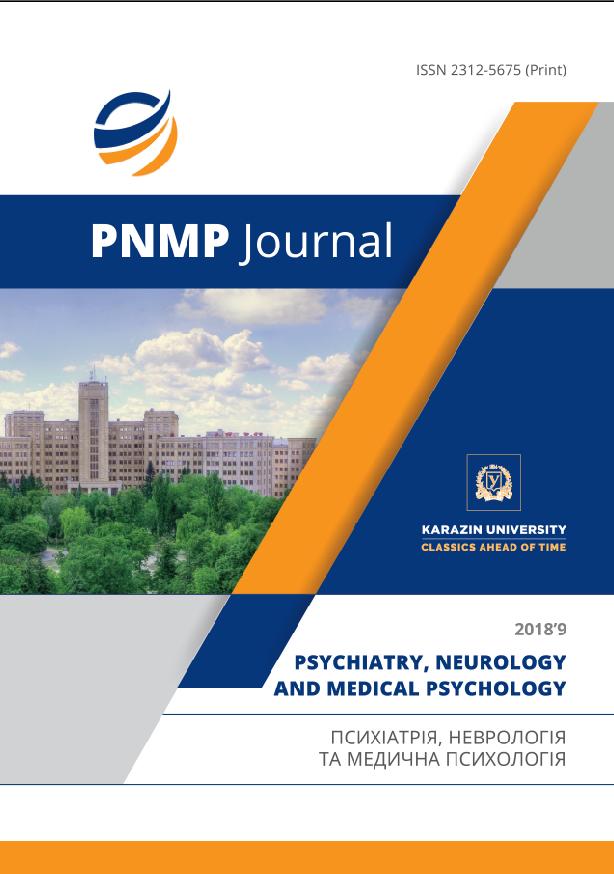МОДЕЛЬ ПСИХОПАТОГЕНЕЗУ НЕПСИХОТИЧНИХ ПСИХІЧНИХ РОЗЛАДІВ У ОСІБ, ЯКІ ПРОХОДЯТЬ ПРОГРАМУ СИНТЕТИЧНОЇ ОПІОІДНОЇ ЗАМІСНОЇ ТЕРАПІЇ.
Анотація
З метою виявлення структурно-динамічної характеристики коморбидної непсихотичної психопатологічної симптоматики у хворих, які перебувають на програмі замісної терапії синтетичними опіоїдами, за допомогою симптоматичного опитувальника (Simptom Check List-90-Revised) було обстежено 100 пацієнтів наркологічного диспансеру. У дослідженні використані критерії включення і виключення, ідентичні критеріям участі в програмі замісної терапії. Отримані результати були розподілені на 3 рівня, які відповідають ступеню клінічної значущості симптомів: - мінімальний (дискомфорт з цієї причини відбувається рідко або взагалі не виникає, він має низьку інтенсивність) - діапазон отриманих результатів від 0 до 0,50; - субклінічний (наявність не частого, помірно інтенсивного дискомфорту через це) - діапазон значень від 0,51 до 1,50; - клінічний (частий або постійний високої інтенсивності дискомфорт з цієї причини) - діапазон значень більше 1,51. В результаті дослідження було виявлено, що непсихотичні психічні розлади серед даного контингенту хворих мають три етапи розвитку; всі групи симптомів розглядаються в контексті трьох основних класів розладів (патоафектівні - симптоми тривожністі і депресії, псевдоневротичні - обсесивно-компульсивні явища, психовегетативні симптоми і порушення самосприйняття і психоорганічні - асоціативні порушення, паранояльність і ворожість) та двох груп проміжних симптомів (фобічні - проміжні між патогенними і псевдоневротичними і психотичні - проміжні між психоорганічними і псевдоневротичними). Так само за результатами оцінки кореляційної динаміки груп симптомів була побудована модель психопатогенезу непсихотичних психічних розладів у осіб, які перебувають на програмі замісної терапії наркоманії
Завантаження
Посилання
Trujols J. Patient perception of methadone dose adequacy in methadone maintenance treatment: The role of perceived participation in dosage decisions / J. Trujols, F. González-Saiz, M. J. Manresa // Patient Education and Counseling. – 2017. – Vol. 100, № 5. – P. 981–986.
Барановский Н. А. Социальная профилактика наркомании среди молодежи / Н. А. Барановский // Социологический альманах. – 2017. – № 8. – С. 115–126.
Pharmacogenomics of methadone maintenance treatment / A. A. Somogyi, D. T. Barratt, R. L. Ali, J. K. Coller // Pharmacogenomics. – 2014. – Vol. 15, № 7. – P. 1007–1027.
Цыганков Б. Д. Подходы к лечению абстинентного, постабстинентного состояния наркологических больных / Б. Д. Цыганков, С. А. Шамов, М. Н. Земсков // Росс. мед. журн. – 2013. – № 4. – С. 32–36.
Wang G. Y. Methadone maintenance treatment and cognitive function: a systematic review / G. Y. Wang, T. A. Wouldes, B. R. Russell // Current Drug Abuse Reviews.
– 2013. – Vol. 6, № 3. – P. 220–230.
Scaling up methadone maintenance treatment for opioid-dependent prisoners in Iran / M. Farnia, B. Ebrahimi, A. Shams, S. Zamani // International J. of Drug Policy. – 2010. – Vol. 21, № 5. – P. 422–424.
Predictors of non-adherence to methadone maintenance treatment in opioid-dependent individuals: implications for clinicians / P. Roux, C. Lions, L. Michel [et al.] // Current Pharmaceutical Design. – 2014. – Vol. 20, № 25. – P. 4097–4105.
Incarcerated intravenous heroin users: predictors of post-release utilization of methadone maintenance treatment / H. C. Lin, P. W. Wang, Y. H. Yang [et al.] // J. of Addictive Diseases. – 2016. – Vol.
, № 2. – P. 109–118.
Гребенюк А. А. Клинико-психологический анализ непсихотических психических расстройств у бывших участников программы заместительной поддерживающей терапии и их влияние на мотивацию к прохождению медицинской реабилитации / А. А. Гребенюк // Наркология. – 2016. – № 6. – С. 72.




